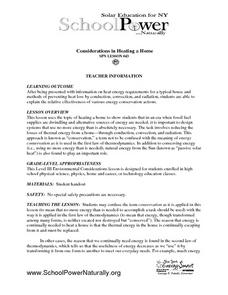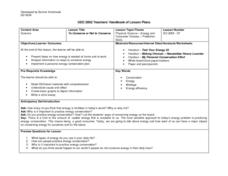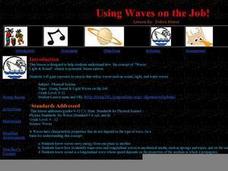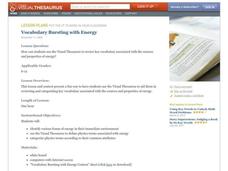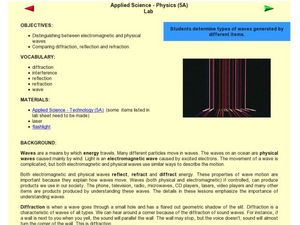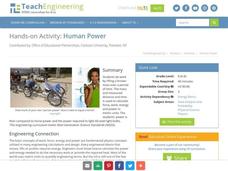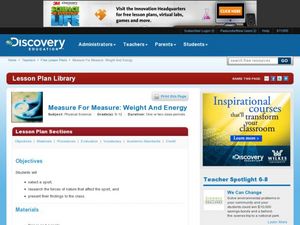Curated OER
Considerations in Heating a Home
Emerging engineers discover how important it is to conserve energy as fossil fuel supplies are being diminished. This is accomplished by working through a handout that explains energy requirements for heating a home during the winter....
Curated OER
The Chemistry of Refining Crude Oil
Consider our energy sources: wood, coal, oil, uranium. Learners compare the pollution to energy produced for each. They practice fractional distillation of an alcohol/water mixture to simulate the process of refining crude oil....
Curated OER
Solar Kit Lesson #13 - Solarize a Toy
Physical science or technology classes will be invigorated by this challenge: to convert a toy, game, or other device to run on solar power. In doing so, they will design the appropriate solar arrays. This is an A+ lesson, complete with...
Curated OER
TO CONSERVE OR NOT TO CONSERVE
Students explore how energy is wasted at home and at work and develop a program to save energy in a specific area.
Curated OER
Get Charged!
Students explore the concept of electricity in this activity based unit. For this physical science lesson, students focus on electricity and electrical engineering. The teaching unit includes 5 activities to develop students conceptual...
CK-12 Foundation
Bow and Arrow
Where does the energy of an arrow come from? Is it from the person, the bow, or somewhere else? A simulation allows scholars to adjust the stretch distance and the elastic constant in order to understand where the energy comes from, what...
Curated OER
Using Waves on the Job!
A colorful and comprehensive PowerPoint highlights this lesson on waves. Junior geophysicists pretend that they are hired to analyze seismic waves. A worksheet is provided to go along with an online article about how compact discs work...
Curated OER
Solar Kit Lesson #1 - Solar Cell Inquiry
Give youngsters the components of a solar-powered electric circuit and turn them loose to figure out how to connect them in order for a light to shine or motor to turn. They compare energy output of a solar panel to that of a battery. On...
Savvas Learning
Let's Get Moving
Scholars examine, cut, paste, and sort 12 images featuring different types of movement in order to show what they know about energy—potential and kinetic.
Cornell Lab of Ornithology
Amazing Birds
What's so amazing about birds? Find out just how amazing birds are with a physics of animal behavior unit created by Cornell Lab of Ornithology. Have learners explore and tap into their observational skills and notice how birds fly, what...
Curated OER
Junior Solar Sprint Series: Gears and Drive Belts
Activate middle schoolers' minds with this physical science activity. Learners vary the diameter of gears and the number of teeth on them to find how energy output is affected. This writeup features well-developed background information...
Curated OER
Vocabulary Bursting with Energy
Students review key physics terms using a Visual Thesaurus. In this science lesson, student groups compete against each other to correctly identify "imposter" words from a list of related physics vocabulary terms.
Curated OER
Electromagnetic and Physical Waves
Students compare and contrast electromagnetic and physical waves. In this wave instructional activity, students discover that all waves reflect, refract, and diffract energy. Students work in small groups to experiment with waves and...
Curated OER
Power and Auroras
For this power and auroras worksheet, students read about the relationship between power, work and energy and how the power of auroras are measured by the light they produce. Students use a data chart of the Great Aurora of 2003 to...
Teach Engineering
Human Power
How many humans does it take to power a light bulb? The 10th part of a 25-lesson Energy Systems and Solutions unit has learners conduct an experiment to calculate power. They then use the results to determine how many classmates they...
CK-12 Foundation
Capacitor Simulation
The camera flash works based on a simple circuit, but why does it require a capacitor? Scholars work through two levels of simulations related to circuits and capacitors. The pupils first use a simple circuit with a battery, resistor,...
Flipping Physics
AP Physics 1: Linear Momentum and Impulse Review
Help pupils review for the portion of the AP Physics exam that covers linear momentum and impulse review with a short video that covers an extensive amount of material.
Scholastic
Extension Activity Building a Healthy Classroom Community
Workout buddies aren't just for adults! Learners discuss the benefits of 60 minutes of physical activity each day and generate ideas for how they can accomplish this by working toward a goal with friends.
NASA
Measuring Dark Energy
You're only 10 minutes late? Do you know how much the universe has expanded in those 10 minutes? Scholars graph supernovae based on their redshift and see if the results verify Hubble's Law. If it does confirm it, the universe is...
Special Olympics
Review of Skills as Sports
Young athletes put together the athletic skills they need to play different sports in the eighth week of this physical education unit. First they work on basic skills like running, jumping, kicking, throwing, and catching. Next, children...
MENSA Education & Research Foundation
Roller Coaster Mania!
Raise the energy level of your physical science class with this exciting hands-on activity. Applying their knowledge of kinetic and potential energy and Newton's laws of motion, young engineers use foam tubing and marbles to create...
Curated OER
Nuclear Reactions: Fission and Fusion
These nicely designed slides work through the processes of nucelar fission and fusion with very clear, labeled diagrams that almost act as animations when you progress from slide to slide. Facts behind the process are summarized well....
Curated OER
Applied Science- Physics
Students investigate how something at home uses physics to work. In this practical physics lesson, students develop a theory of their own to conclude how an object might work. This lesson plan includes a worksheet.
Curated OER
Measure for Measure: Weight and Energy
High schoolers study the friction of a particular sport. In this weight and energy lesson students choose a sport and us the Internet to research it then present their findings to the class.


